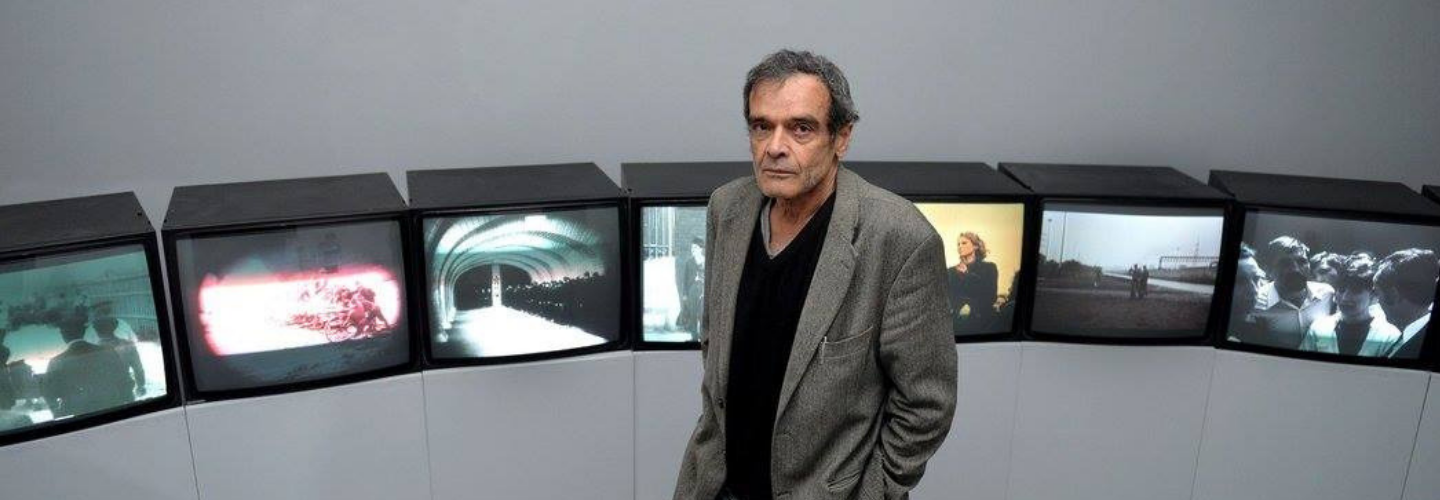Event Details
Date & Time:
Fri February 9, 2018 - Thu March 8, 2018
Location:
The Block Museum of Art
40 Arts Circle Drive
Evanston, IL 60208
Audience:
Open to the public
Details:
Over nearly 50 years, German documentary filmmaker and essayist Harun Farocki (1944-2014) created more than 100 bold, playful, and cerebral films, videos, and installations. His astute and brilliant observations of the contradictions of German society, politics, and economics, and how these national issues are situated in a global context, quickly distinguished him as a unique and passionate critical voice in world cinema. The film series Inextinguishable Fire provides a concise introduction to the work of this prolific artist through a representative cross-section of his films, from his rebellious 1960s agit-prop short films to later works—biting critiques of the media, consumerist society, and representations of war. Through their formal inventiveness Farocki’s films trouble our usual understanding of the phenomenological and ideological conventions of cinematic representation. This series showcases an artist whose insatiable curiosity and relentlessly skeptical views on German and international politics and society are already sorely missed only four years after his death.
Presented in collaboration with the Goethe Institut and the Northwestern Department of German.
Curated by Anna Parkinson and Jan Behrs, Department of German
Europe is Burning
Friday, February 9, 2018 7:00 PM FREE
This program features several of Farocki’s earliest films, made at a time when his work was at its most overtly political. The Words of the Chairman is an agit-prop “commercial” that demonstrates how words can be weapons as it skewers the Shah of Iran and his wife, who are presented as cartoonish figures. Their Newspapers grew out of the student protests against the Springer press group, whose newspapers were being criticized for their bias. White Christmas uses the iconic Bing Crosby song in a denunciation of the Vietnam War. One of Farocki’s most celebrated films and a masterpiece of essay filmmaking, Inextinguishable Fire concerns the manufacture of napalm, issues of labor and accountability, and the social, political, and corporate structures that normalize the horrors of war.
The Words of the Chairman (Die Worte des Vorsitzenden, 1967, Germany, digital, 3 min.)
Their Newspapers (Ihre Zeitungen, 1968, Germany, digital, 17 min.)
White Christmas (1968, Germany, digital, 3 min.)
Inextinguishable Fire (Nicht Löschbares Feuer, 1969, Germany, digital, 25 min.)
All-Consuming Shopping Worlds
Thursday, February 22, 2018 7:00 PM FREE
The two films in this program exemplify one of Farocki’s frequent interests: the capitalist and corporatist production, marketing, and consumption of goods and services. These films, and others, look at the systems and structures of local and global economies to reveal the careful constructions of creating and then meeting consumer demands. A Day in the Life of a Consumer is a collage work made from 40-years-worth of advertising films. It constructs humorous “day in the life” of average consumers. The Creators of the Shopping Worlds is an observational look at the planners, managers, analysts, and others involved with designing shopping malls. Customer behavior, human traffic flow, impulse buying, and other aspects of retail experience are identified, studied, and managed to maximize profit.
A Day in the Life of a Consumer (Ein Tag im Leben der Endverbraucher, 1993, Germany, digital, 44 min.)
The Creators of the Shopping Worlds (Schöpfer der Einkaufswelten, 2001, Germany, digital, 72 min.)
Catch Phrases—Catch Images
Thursday, March 1, 2018 7:00 PM FREE
The ways in which reality is shaped by media is the connecting subject of these two works. In the short Catch Phrases Catch Images: A Conversation with Vilem Flusser, Farocki interviews the noted philosopher Flusser about the design of the front page of the tabloid newspaper Bild Zeitung—how image and text are inseparable and how those elements are used to shape meaning. For Videograms of a Revolution, Farocki collaborated with Romanian writer Andrei Ujica. The film is an exploration of the 1989 overthrow of Romanian leader Nicolae Ceaușescu, drawn from broadcasts of the state television station (which demonstrators had taken over and were using to televise images of the ongoing revolution) and from footage shot by amateur videographers all over Bucharest. The images of the revolution helped shape the revolution itself, and any later understanding of these events is unavoidably shaped by these mediated images.
Catch Phrases Catch Images: A Conversation with Vilem Flusser (Schlagworte Schlagbilder: ein Gespräch mit Vilem Flusser, 1986, Germany, digital, 13 min.)
Videograms of a Revolution (Videogramme einer Revolution, co-directed by Andrei Ujica, 1992, Germany, digital, 106 min.)
Blind Spots of Memory
Thursday, March 8, 2018 7:00 PM FREE
The limitations of historical memory, and the insufficiency of historical documentation to accurately reflect history, are at the center of these two films that focus on war. In Respite, Farocki charts the transformation of the WWII Dutch refugee camp, Westerbork, first into a Nazi-controlled “transit” camp for Jewish prisoners on their way to concentration camps, and then into a prison work camp once the majority of Jews in the Netherlands had been deported. Traces of documentation both hide and reveal the dark history of the place. The invisibility of, or the unwillingness to see, the visual evidence of the Auschwitz concentration camp in WWII American aerial reconnaissance photographs of the IG Farben factory is the subject of Farocki’s masterful Images of the World and the Inscription of War. Farocki constructs an elegant, thoughtful essay-film on the nature of images, the creation of knowledge, and the ways in which violence is often secretly inscribed in seemingly innocuous places.
Respite (Aufschub, 2007, Germany, digital, 40 min.)
Images of the World and the Inscription of War (Bilder der Welt und Inschrift des Krieges, 1988, Germany, digital, 75 min.)
Contact The Block Museum of Art for more information: (847) 491-4000 or email us at block-museum@northwestern.edu
